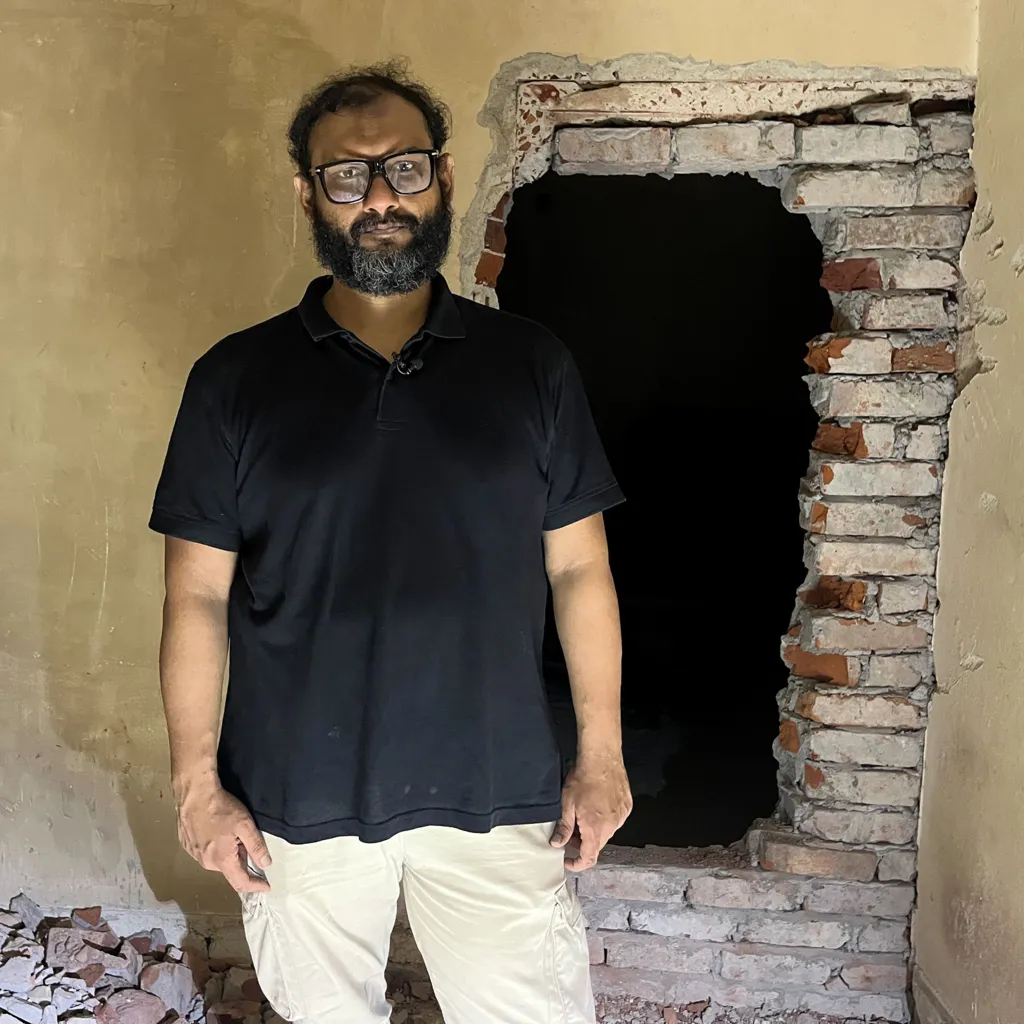When investigators smashed through a hastily built wall, they uncovered a set of secret jail cells.
It turned out to be a freshly bricked-up doorway – an attempt to hide what lurked behind.
Inside, off a narrow hallway, were tiny rooms to the right and left. It was pitch-black.
The team may never have found this clandestine jail – a stone's throw from Dhaka's International Airport – without the recollections of Mir Ahmad Bin Quasem and others.
A critic of Bangladesh's ousted leader, he was held there for eight years.
He was blindfolded for much of his time in the prison, so he leaned on the sounds he could recall – and he distinctly remembered the sound of planes landing.
That was what helped lead investigators to the military base near the airport. Behind the main building on the compound, they found the smaller, heavily guarded, windowless structure made of brick and concrete where detainees were kept.
It was hidden in plain sight.
Investigators have spoken to hundreds of victims like Quasem since mass protests toppled Prime Minister Sheikh Hasina Wazed's government last August, and inmates in the jails were released. Many others are alleged to have been killed unlawfully.
The people running the secret prisons, including the one over the road from Dhaka airport, were largely from an elite counter-terrorism unit, the Rapid Action Battalion (RAB), acting on orders directly from Hasina, investigators say.
"The officers concerned [said] all the enforced disappearance cases have been done with the approval, permission or order by the prime minister herself," Tajul Islam, the chief prosecutor for the International Crimes Tribunal of Bangladesh, told the BBC.
Hasina's party says the alleged crimes were carried out without its knowledge, that it bears no responsibility and that the military establishment operated alone – a charge the army rejects.
Seven months on, Quasem and others may have been released, but they remain terrified of their captors, who are serving security force members and are all still free.
Quasem says he never leaves home without wearing a hat and mask.
"I always have to watch my back when I'm travelling."
'Widespread and systematic' jail network
He slowly walks up a flight of concrete steps to show the BBC where he was kept. Pushing through a heavy metal door, he bends his head low and goes through another narrow doorway into "his" room, the cell where he was held for eight years.
"It felt like being buried alive, being totally cut off from the outside world," he tells the BBC. There were no windows and no doors to natural light. When he was inside, he couldn't tell between day or night.
Quasem, a lawyer in his 40s, has done interviews before but this is the first time he has taken the media for a detailed look inside the tiny cell where he was held.
Viewed by torchlight, it is so small an average-sized person would have difficulty standing up straight. It smells musty. Some of the walls are broken and bits of brick and concrete lie strewn on the ground – a last-ditch attempt by perpetrators to destroy any evidence of their crimes.
"[This] is one detention centre. We have found that more than 500, 600, 700 cells are there all through the country. This shows that this was widespread and systematic," says Islam, the prosecutor, who accompanied the BBC on the visit to the jail.
Quasem also clearly remembers the faint blue tiles from his cell, now lying in pieces on the floor, which led investigators to this particular room. In comparison to the cells on the ground floor, this one is much larger, at 10ft x 14ft (3m x 4.3m). There is a squatting toilet off to one side.

